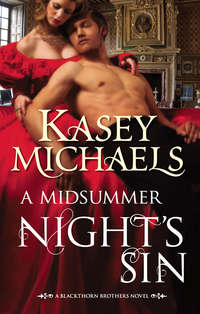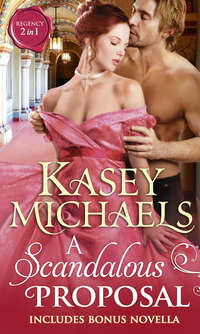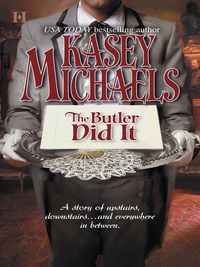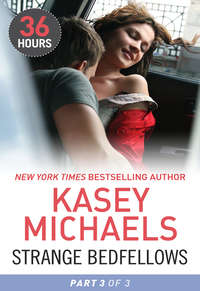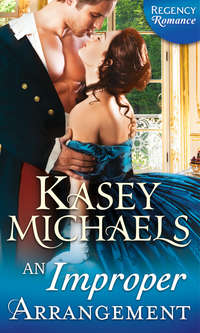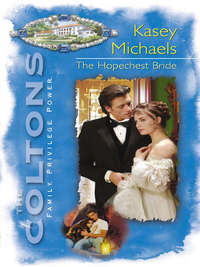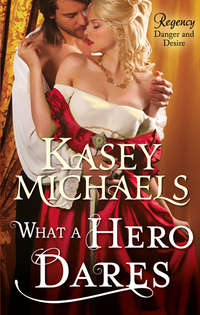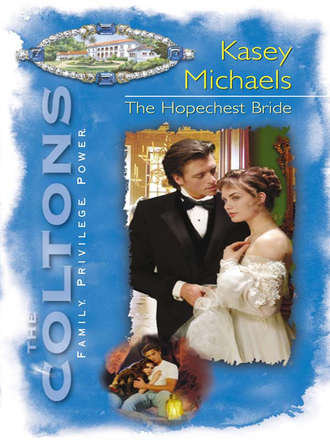
Полная версия
The Hopechest Bride
Emily watched as Sophie and Meggie headed for the hallway and stairs, then sat back in her chair, admiring the way her sister had decorated the living room. Part Mission, part antique, somehow Sophie had made it all work beautifully, from the western prints on the walls to the Oriental carpet on the broad-planked floor.
She’d like her own place, her own apartment, but the Hacienda de Alegria was so large that it would be difficult to explain to her mom and dad that she felt cramped, felt the need for her own space. Especially now, with Meredith only back at the ranch for less than two weeks. It had never been right to leave Joe, who had been so unhappy, and it couldn’t be right to leave now, with Meredith home again at last.
Still, much as they loved her, Emily was beginning to feel smothered by that love. They watched her, as if she were a fragile vase teetering on the edge of a mantel, ready to fall, smash into a million pieces on the hearth. And now not only were her parents watching her, but Dr. Martha Wilkes was also here, living in the house, eating at the table, being so nice and kind and caring.
The woman was wonderful, really. But Emily felt as if she were constantly under a microscope, so that she was careful to always keep her guard up. Keep smiling, keep helping around the ranch, keep her hurt and despair hidden, locked behind her bedroom door, crying only in the shower, so that no one would hear her. She’d been taking an awful lot of showers lately….
Sophie came back into the room and sat down on the couch with a sigh. “There, that’s done. She’s been changed and put into jammies, and we’ll have blessed peace for about two hours, if we’re lucky. Then playtime with Daddy, a bath and dinner—and probably another bath, as Meggie’s gotten pretty good at blowing raspberries at us with her mouth full. That’s a real treat when she’s eating mashed beets, let me tell you. Riv puts her down for the night and sings to her—but you didn’t hear that one from me, okay, as he’d probably deny it. He’s a wonderful, wonderful father.”
Emily looked at her sister, at the smile on Sophie’s lovely face, a face still carrying the scar of a mugger’s attack. Funny. When Sophie had first run back to the ranch, to hide there, hide her face, it was assumed by everyone that she’d have plastic surgery the moment the surgeon said it was time. But then she’d gotten pregnant, and then there’d been Meggie to take care of, and it was as if Sophie had forgotten the scar even existed. She was too busy living her life, loving her life, to see it.
“You’re happy, aren’t you, Soph?” Emily asked, knowing the answer. “I mean, you have a sort of glow about you.”
“Oh, dear,” Sophie said, sitting up straight. “It shows? We wanted to wait until Christmas to tell everybody, but if you see it, Mom and Dad are bound to see it.”
“See what?” Emily asked, confused.
“That we’re pregnant again,” Sophie announced, lightly pressing her hands to her flat belly. “We hadn’t planned another baby this soon, but now Meggie will have a little brother or sister to play with, and we like that idea. Riv is already planning an addition to the house.”
“That’s how Mom and Dad started, isn’t it? And the Hacienda de Alegria just grew and grew. I’m so happy for you.” Emily smiled, while inside she sighed, silently crossing off the idea of coming to live in Sophie’s spare room for a few weeks—at least until Dr. Wilkes went back to Mississippi. It had been a bad idea anyway, one born of desperation.
Laughing, Sophie answered, “True enough, Em, but Riv and I don’t have plans to repopulate the entire earth—just our small part of it. Okay, now tell me what’s on your mind, and don’t tell me ‘nothing,’ because I won’t believe it.”
“I’m that transparent, huh? I thought so, which is one of the reasons I was hoping to come hide out with you guys for a while,” Emily heard herself admitting, so that she quickly picked up another peanut butter cookie and shoved half of it into her mouth—right next to her foot.
“You want to get away from the ranch? Why?”
Emily pushed a hand through her hair, tucked a heavy lock behind one ear. “Okay, I’ll tell you. Mom’s sicced Dr. Wilkes on me, that’s why, among other things. The other things I can live with, but Dr. Wilkes gives me the creeps. It’s like she can see straight through me.”
“And can she?” Sophie asked, doing a fair job of looking straight through her sister herself.
“Oh yeah. Straight through me, Soph. It’s scary.” Emily put both hands to the back of her neck, then pushed up, so that her mass of wavy hair all piled high, then fell to her shoulders once more when she moved her hands, making a chestnut cloud around her head. A quick shake of her head and those curls covered half her cheeks and most of her expression. She hadn’t even known what she’d done.
But Sophie did.
“Ah, the old hide-my-face-behind-my-hair trick,” Sophie said, wagging a finger at Emily. “You do know that’s a dead giveaway, don’t you, sis? Emily’s early-warning system reaction to impending trouble. You’ve been doing that since you were a kid.”
“I have?” Emily went to shake her head, stopped herself. “You’re making that up.”
“Oh, really? I’ve got examples, Emily, and I’m more than willing to share. Like the day Mom came into the living room and asked who had broken the glass in a picture frame in the library, and forgotten to take away the baseball that had done the job. That time Dad asked for volunteers to muck out the stalls because half the hands were down with food poisoning. The day the phone rang and it was Mrs. Hatcher, your second grade teacher, calling to talk to Mom. And it wasn’t to say that Emily Colton was her prize student.”
“Mrs. Hatcher. Ugh! The woman accused me of eating paste. Double ugh! And I’d only taken a small bite.”
“Ah, so you do remember. But the point I’m trying to make is that the moment you felt the slightest bit in danger, you found a way to pull your hair over your face, like an ostrich hiding its head in the sand. It was always a dead giveaway. Trouble comes, and Emily hides behind her hair. It’s as dependable as Inez’s success with peanut butter cookies.”
Emily felt her cheeks flushing, and raised one hand toward her hair before quickly clasping her hands together in her lap. Was her hair always destined to betray her? “I hate my hair,” she said quietly, but with a wealth of feeling. “I should shave it all off.”
“Don’t you dare, Emily Colton! You’re a beautiful woman, but that hair of yours is absolutely extraordinary. Why, I could pick you out in a crowd of thousands, just from one glimpse of that head of hair. You have enough for five people, all on your one head. And the color! You can’t get that out of a bottle, Emily. I know, because I tried one time, in college. I ended up looking like a circus clown.”
“Lots of people could pick me out of a crowd because of this hair of mine,” Emily said, blinking back sudden tears. “Oh, damn. Sophie, what am I going to do? Toby Atkins is dead because of me, and his killer told the police that one of the ways he could track me was because of my hair. People remembered it, remembered me, and Silas Pike was able to find me because of it. Toby Atkins died because Silas Pike was able to find me.”
Sophie was silent for some moments. “Oh, wow,” she breathed at last. “So you’re blaming yourself for Toby Atkins’s death? Because of your hair?”
Emily shook her head, sniffed back tears. “No, not really. Not just the hair. But I should have disguised myself, Sophie, or at least cut my hair, hidden my hair. I’m not stupid, I know my hair is distinctive. I’m guilty because I was arrogant, Sophie. I thought I was so smart. I thought I’d hidden myself brilliantly. And then I didn’t tell Toby the truth. He was a sheriff, Sophie. I should have trusted him, told him, and then he would have been prepared when trouble came.”
“You said all this to Dr. Wilkes?” Sophie leaned forward when Emily remained silent. “Emily? You did tell her, didn’t you?”
Emily shook her head. “I didn’t have to. She knows it was all my fault. Everyone knows,” she said, a sudden mental picture of Josh Atkins’s hard, condemning eyes making her shiver. She banished that image quickly, knowing it would be back, to haunt her dreams, cloud her days. “That’s why she’s here, to help me work through my guilt. Like that’s going to happen. Like she can somehow change what happened.”
Sophie stood up, walked around the coffee table, sat down on the arm of Emily’s chair and put her hand on her sister’s shoulder. “You do know, Emily, that you’re doing again what you said you did about your hair. You’re assuming that Dr. Wilkes believes you’re guilty. I doubt she’s as harsh a jury as you’ve been to yourself. Because I see it another way, sis. I see a young woman running scared from a murderer, running for her life, and yet trying to hang on to as much of her former life as she can. I see a young woman who knew Toby Atkins was falling in love with her, and was too honest to lead him on, make him her protector, put him in danger. You nearly died that night, Emily, and Toby Atkins saved your life. He’s a hero, Em. Don’t demean his sacrifice. Don’t make him into a victim, into your victim. He deserves better than that.”
Emily looked up at her sister, then buried her head against Sophie’s side, sobbing.
Josh Atkins felt like a stalker. Probably because that was what he was doing—stalking Emily Blair Colton. His every free hour was spent with his horse tied to a tree as he crouched behind scrub and looked down on the Hacienda de Alegria. He watched the comings and goings at the ranch, waited for Emily Blair Colton to put up her head, sniff the wind and then leave the safety of her well-guarded sanctuary.
Go somewhere where he could get at her, get to her, remind her that he was here, that he wasn’t going away.
He’d picked up the Rollins Ranch mare two days ago, and hung around the Hacienda de Alegria until his presence began drawing questioning looks, then had to leave before Emily showed up at the stables. Since then, there’d been no reason, no good excuse, to bring him back to the Colton ranch.
So he’d propped himself against a lamp post on Prosperino’s main street, hoping to see Emily Colton come to town to go shopping, to have her hair done, to eat lunch with some friends. That hadn’t worked, either. Prosperino wasn’t that small a town, but the Coltons were pretty obvious by their absence. Not a single Colton had walked or driven down Prosperino’s main street, and Josh could be sure of that, as he had memorized the photographs he’d cut out of newspapers covering the story about Patsy Portman.
Which had brought him back to this hill, this well-concealed vantage point. Another couple of weeks at this, and he’d earn his Stalker merit badge, while losing what was left of his mind.
He might have had no luck in meeting up with Emily, but he had learned a lot about the Coltons, starting with everything he’d read in the newspapers, and added to during his research at the Prosperino Public Library. He might be a cowboy, but he was a community-college-educated cowboy, and he knew how to use the microfiche machine, knew how to go through old newspaper files and find what he wanted.
The Coltons were a good family. He didn’t want to admit that, even to himself, but by all accounts they were a good, fine, upstanding family, from Joseph Colton right down to the youngest member.
Hopechest Ranch thrived because of the early interest shown by the Coltons, and all of the family was still heavily involved in the financing of the haven for troubled children, some of them even in the day-today running of the facility.
The Coltons had raised their own children even as they’d taken on any number of foster children, even adopted some of them, like Emily Blair Colton. It was one thing for a wealthy, successful man to throw money at a charity, but it was another thing entirely for that man to become so involved, so much a part of the solution.
And it wasn’t as if the Coltons always had it easy, been born with silver spoons in their mouths and immune from trouble. Joe Colton had served in the armed forces, then built his empire with his own hands. He’d served his country again as a United States Senator. Joe and Meredith Colton had lost a son to a traffic accident. One of their daughters had almost been killed by a mugger in San Francisco. Joe Colton himself had nearly been murdered by a disgruntled employee.
Not to mention the entire family being duped for ten long years by Meredith Colton’s mentally unbalanced twin sister. That had to be the topper.
So maybe the Colton life wasn’t a fairy tale complete with the rich and benevolent king and queen and populated by happy, carefree princes and princesses.
But did that excuse Emily Colton from guilt in the death of his only brother? Josh didn’t think so. Emily Colton could have run to a dozen different places, put herself under the protection of one of her brothers, or even turned to Joe Colton, who would have surrounded her with armed guards.
Instead, she had run away. She’d run straight to Keyhole, Wyoming, and to Josh’s brother, who was just the kind of guy who saw himself as a knight in shining armor, out to put a smile back on the face of the pretty young princess who’d somehow come into his orbit.
“I should have known,” Josh muttered under his breath as he watched the lights coming on inside the sprawling ranch house. “I should have read Toby’s letters more carefully, realized he was getting in over his head. I should have left the circuit and gone to Keyhole, checked Emma Logan out for myself.”
And he would have, except he’d been chasing another gold buckle, following the rodeo circuit from town to town in Oklahoma and Texas and even New Mexico. Everywhere but Keyhole, Wyoming. Chasing the points, chasing the dream, chasing the buckle of a champion. A grown man acting like a kid, while a kid was wearing the uniform of a sheriff and laying down his life in the line of duty.
Who was the younger Atkins? By age, Toby had been. But by deed, Josh knew himself to be the child, the little boy who’d yet to grow up, take his share of responsibility—that share he’d gratefully dropped after almost single-handedly raising Toby.
It had been his turn, or so he’d told himself. He’d been a man when he was supposed to be a boy, and he’d spent the last ten years trying to capture some of the blessed freedom from responsibility most children experienced in their growing-up years.
At least that was his excuse, the one he told himself when he looked at yet another gold buckle, at the prize money he’d spend at least half of as fast as he’d earned it on the back of a bucking bronco.
A few more years, a few more seasons, and he’d settle down, buy himself a small spread with the savings he did have, raise horses and cattle and break broncos to saddle for those who would ride, but not take a chance on breaking their necks to tame a mount.
He would have bought that spread, too, and Toby would have left his sheriff’s job in Keyhole and come with him. Josh had planned it all, vaguely, but now that plan seemed as solid as the rock walls of the Grand Canyon, as if he’d only been months away from leaving the circuit. Months away from removing Toby from Keyhole.
Josh took off his Stetson and raked his gloved fingers through his hair. That was how it would have been, if Emily Colton hadn’t come into Toby’s life. It was.
Josh had to believe that. He had no other choice. Otherwise, the guilt was all his….
Four
Martha Wilkes sat near the French doors with her hands folded in her lap, looking out onto the patio and Meredith’s fountain.
The gardens were fairly bare now, but so well-landscaped that they were still attractive to the eye as the California version of winter approached from the Pacific. It was so peaceful here, so beautiful, and yet the Hacienda de Alegria had been the scene of a ten-year-long nightmare.
Martha had just completed another session with Meredith, although neither of them called them sessions. They just talked. Talked about the house and how Meredith was putting it back to the way it had been before Patsy’s rather overblown decorating ideas had changed the casual comfort of the house into something stiff, and formal, and cold.
Meredith’s bedroom furniture, which had been stored in one of the outbuildings, was now back in the repainted master suite, as was Joe, who had not slept there for many years. Meredith might not know it, but she was performing a sort of exorcism, banishing her twin sister’s presence from this most private sanctuary of her marriage.
“Does it bother you, Meredith, that there was a time when Joe did share that room with Patsy?” Martha had asked over cups of green tea.
“He didn’t know,” Meredith had replied quietly, then looked Martha square in the eye. “But I’d be lying to you if I didn’t think that possibly he should have known. Lovemaking…well, it’s such an intimate thing, such a unique thing, so special to the two people involved. His wants, my needs, the way we used to laugh and talk long into the night afterward…how could he not have noticed the differences?”
“Is it possible that, at first, he blamed the accident? You supposedly had suffered an injury to your head, remember,” Martha remembered suggesting. “And after that, after Teddy? He had his own room from that time on, didn’t he? He would have divorced you—Patsy—if it hadn’t been for the many years of love that had built your marriage wide and high and deep enough to convince Joe to hang on through the bad times.”
“The bad times,” Meredith had said, sighing. “Yes, that’s one way of thinking about it all. The worse in our for better or worse.”
“Yes, Meredith. Just as you hung on through the bad times you now remember, when Joe was so depressed after your son’s death, and again when Joe learned he was sterile. You stuck with him, and in his turn he was, by God, going to stick with you. He loves you, Meredith. He has always loved you. He tolerated that woman in his bedroom, but he never loved her. He loved the memory of you.”
Martha closed her eyes, recalling the thoughtful look on Meredith’s face when she’d finished speaking. She’d gotten through to Meredith, that had been obvious. But, then, Meredith wanted help, wanted Martha’s counsel, was eager to put answers to lingering questions, and then get on with her life. Meredith was anxious to grab at her new happiness with both hands, after a decade spent believing she’d been a murderer, a woman with the most sordid past imaginable. A woman with no family, no love, no real hope.
And if Martha could help Meredith find hope again, feel free to embrace love again, then she would do everything in her power to make it all happen. Because Meredith was more than her patient, she was also her friend.
Martha didn’t envy Meredith. That would be ridiculous, considering the hell that woman’s life had been, and looking at the struggles that still awaited her these next months, until the patterns of a lifetime overtook and erased the bad years. But she did wish, when she was being Martha, illogical woman, rather than Dr. Wilkes, professional therapist, that she could wake up one morning and find her family, her children, her love of life, her hopes for the future.
How had she gone from optimistic girl to this automaton who went through her days, her years, with only her career to show for the trip? No family, few friends. How had she come to be nearly fifty years old, and then wonder where her life had gone? Too late for children. Probably too late for a husband—not that she had ever thought of marrying, even as a young girl. She’d had her career, had longed for her career.
But children? She hadn’t realized how empty her arms and heart would feel, at fifty, because of a decision she’d made at twenty.
“Excuse me?”
Martha blinked away her thoughts and turned in her chair, to see yet another slightly familiar face standing behind her. She’d met so many Coltons, biological and adopted and just plain assimilated into this huge, loving family. But she thought she could put a name to this particular face. “Rebecca? Rebecca McGrath? Do I have that right?”
Rebecca smiled as she approached, sat down in the chair placed at a right angle to Martha’s. Martha admired the understated grace with which the tall, slim young woman moved, even as her belly swelled with pregnancy. “Yes, Dr. Wilkes, you do. Could I possibly bother you for a few minutes? Professionally.”
“Professionally?” Martha carefully slid her psychologist shield up and over her own tender heart, prepared to be friendly, but not make herself vulnerable—or betray any confidences if Rebecca had come to ask questions about Meredith. “Does this have to do with Meredith? I think I recall that you are one of Meredith and Joe’s foster children. You work as a teacher for the learning disabled at the Hopechest Ranch now. Am I right?”
“You have a good memory, Dr. Wilkes,” Rebecca said, nodding her head. “Especially when I think you must have been introduced to at least thirty of us that first night. And, no, this isn’t about Mom, although I do want to tell you how much we all appreciate the way you’ve helped her over the years. Things could have turned out very differently if Mom hadn’t had you to guide her through.”
“Your mother is a very strong woman, Rebecca. I don’t think there’s much that could knock her down for long. Now, how can I help you—if I can help you.”
Rebecca pushed her long, brown braid back over her shoulder and leveled her intelligent blue-gray eyes at Martha. “This would be strictly pro bono, Dr. Wilkes, as most everyone who helps at Hopechest does so without payment. I thought I should make that clear up front.”
“I do pro bono work, Rebecca. And I’d be happy to help. Is it one of the children?”
Nodding, Rebecca said, “Yes, it is. Tatania. She’s seven, and a real sweetheart. Her father is unknown, and her mother died about three months ago, not that the home life was all that great, according to reports from the social worker who’d been assigned to Tatania nearly from birth.”
“Drugs? Prostitution?”
“Neglect,” Rebecca clarified. “Pure and simple neglect. It happens. Anyway, there was a house fire, which is how her mother died. Tatania was burned, but not too badly, and she came to us two weeks ago. I’m involved because one of the counselors at Hopechest worried that Tatania might be dyslexic, but she’s not. She’s just too shy and scared to participate in anything—her lessons, interacting with the other children, playtime. Nothing. I think I’ve heard her say ten words at one go, tops.”
“Trauma from the fire? From the loss of her mother? You know, even neglectful mothers are loved by their children. Sometimes more fiercely than you’d imagine. They become little parents themselves, taking care of mommy.”
“Anything’s possible, I suppose.” Rebecca shrugged her shoulders. “I don’t know what’s going on, Doctor. That’s why I’m here. We do have a list of child psychologists, but they’re overworked as it is. Plus, Tatania is African American, and I thought…well, that is, I wondered if…”
“If seeing another black face might help?” Martha finished for her, smiling. “Don’t be embarrassed, Rebecca. You’re right. Tatania might feel more comfortable talking to me. When can I see her?”
Rebecca spread her hands palms up, smiled. “Is anything wrong with right now?”
Martha’s professional smile turned into a very real grin. “Not a thing, Rebecca, not a thing. Just let me get my coat.”
Emily backed away from the entrance to the living room, feeling like an eavesdropper, and at the same time feeling as if she’d just gotten a call from the governor, giving her a last-minute reprieve.
Dr. Wilkes was going to Hopechest Ranch, and that meant that Emily didn’t have to talk to her this afternoon, as she’d promised Sophie. It was the one stroke of good luck she’d had in months, years.
Oh, she’d talk to the woman, eventually. After all, she had promised Sophie she would. But if she could put off that talk for another day, another few days…a week? Yes, that would be good, too.


